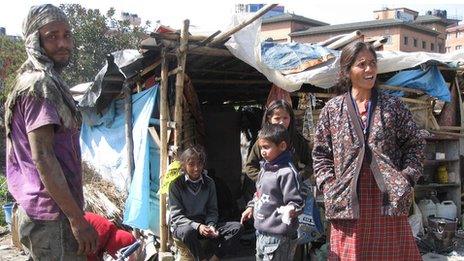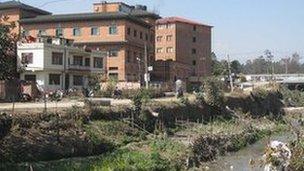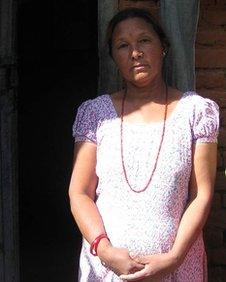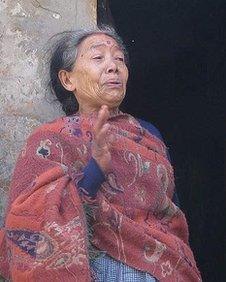Slum dwellers' anger over Nepal Maoist 'decadence'
- Published

Thousands of slum dwellers are facing the prospect of eviction after decades of living by the banks of the Bagmati river in Nepal's capital, Kathmandu. As BBC Nepali's Surendra Phuyal reports, they argue that their enforced departure is being ignored by top political leaders - including senior Maoists who have vowed to champion the cause of the poor.
Nowhere can the argument that Nepal's government is abandoning its proletarian principles be more clearly seen than on the banks of the Bagmati river in central Kathmandu.
The government is preparing to demolish squatters' settlements that have mushroomed in recent decades on the banks of river, which flows through the heart of the capital.
The eviction programme is part of a big project to clean up this once-pristine river, now an open sewer because of massive and unplanned urbanisation.
Flimsy hut
The slum dwellers, who describe themselves as "landless squatters", have no doubt as to who is responsible for their plight.
They vent their anger against the country's Maoist leadership, who have drawn criticism in recent times for their increasingly lavish lifestyles - including performance cars, expensive houses and private medical facilities.
In fact, barely a few hundred metres away from the feeble frames of their homes are the luxury houses and fabulous bungalows of Nepal's elite, among them its top political and business leaders.
"My husband died when I was 24, my son died when he was 29, now I'm waiting for my own death here," said Sashikala Pyakurel, 68, who originally came from eastern Nepal but settled on the river banks about 30 years ago.
The contrast between the flimsy hut she calls home - by the side of a river renowned for its sewage content and industrial pollution - and the affluent nearby properties could not be more striking.
Ms Pyakurel is among an estimated 15,000 squatters living in around 3,000 huts on the riverside. Their homes are being removed to make way for new drainage schemes, roads and, in a few cases, parks.
"The government is telling us to go. But where shall we go?" she laments.
Her neighbour, Kanchhi Lama, 41, came from central Nepal 30 years ago to settle by the banks of the Bagmati. She is equally angry.
"We voted them [the Maoists] to power and now they are enjoying all the luxuries such as nice houses and cars. They must give us alternative [places to live] first," she asserts.
'Genuine landless squatters'

The slum dwellers on the banks of the Bagmati live beneath expensive and imposing properties
Asked if she would heed the government's orders to evacuate the settlement, another slum dweller, Lila Kumari Rayamajhi, 75, expresses her frustration at the recent turn of events.
"They were moving around in sandals until a few years ago. Now the top politicians are living in heaven," she says.
"Before bulldozing our houses, they must build new ones for us."
But the government's Bagmati Civilisation Integrated Development Committee - in charge of the clearances - sees things differently.
Committee Chairman Mahesh Bahadur Basnet insists that "genuine landless squatters" will not be sent off empty-handed.
"We are giving each family a sum of 15,000 rupees ($190/£120) so that they can pay their house rents for a few months," he says.
"Later on, the government will take care of their long-term needs such as housing according to its policy on landless squatters."
'Basic needs'
But assurances such as these do not seem to calm the settlers down.

Kanchhi Lama says alternative homes for slum dwellers must be found
National Landless Squatters' Front Chairman Shiva Prasad Subedi said that government officials and politicians must think twice before launching the eviction drive.
"If the government listens to us and gives us what we deserve, we are ready to co-operate. But before driving us away, they must take care of our basic needs such as housing," he says.
"They know we are poor and that we are suffering while they enjoy all the luxuries. That's why they don't want to come here and see our problems for themselves.
"They were initially out to transform our country and transform the world. But all they have done is transform themselves."
The squatters' frustrations come as reports of the lavish lifestyles of some politicians increasingly make the headlines and provoke negative commentaries in the press.
Recent reported luxuries include:
Maoist leader Prachanda's new mansion with a monthly rent of 103,000 rupees ($1,312/£832) in the heart of Kathmandu
Expensive cars that carry top Maoist and other party leaders
Private medical trips to Japan and other countries by a senior Maoist and top leaders of the Nepali Congress and CPN-UML, the second and third largest parties
But at least President Ram Baran Yadav, who is not a Maoist, has not abandoned his egalitarian beliefs.
He has recently earned accolades by visiting seemingly neglected government hospitals for eye and dental check-ups.
And Maoist Prime Minister Baburam Bhattarai won plaudits for spurning a luxury vehicle and opting instead for a locally-made Mustang.
Upmarket house
According to former Maoist leader Mumaram Khanal - who now edits a left-wing newspaper - President Yadav's example is the exception rather than the norm.

Sashikala Pyakurel says her enforced removal will leave her destitute
He says that most Maoist leaders and workers have "embraced capitalist and materialistic lifestyles".
"They have completely abandoned their simple ways," he said.
"Their ideology exists only in papers. They are no longer communists; they have adopted capitalist neo-liberal ways - they are no different from leaders of other [non-Maoist] parties."
Prachanda has defended the move to his upmarket house.
"It's a rented house - something we were searching for over a long time," he said in a recent interview with the Maoist paper, Janadesh Weekly.
"We needed a more spacious place with bigger parking facilities. This issue has been intentionally blown out of proportion. It's nothing but part of an attempt to defame our party and our movement."
But this row is irrelevant to the slum dwellers along the Bagmati. They are more worried about the imminent big eviction drive.
- Published29 November 2011
- Published1 November 2011
- Published1 September 2011